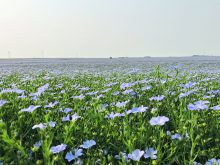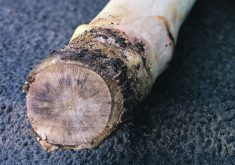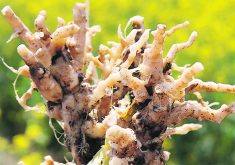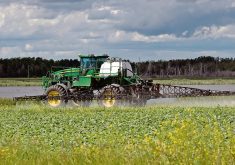Two Saskatchewan oilseed commissions are seeking feedback from growers on a possible amalgamation.
The Saskatchewan Canola Development Commission and the Saskatchewan Flax Development Commission sent notices in the mail to farmers asking them to participate in an online survey.
“Mostly, we want to find out if there’s any major concerns that maybe our boards haven’t thought of,” said Tracy Broughton, executive director of SaskCanola.
“One of the things I have heard as a concern is that flax might be swallowed up by canola.”
Read Also

Research looks to control flea beetles with RNAi
A Vancouver agri-tech company wants to give canola growers another weapon in the never-ending battle against flea beetles.
She said that issue is addressed in provincial regulations that stipulate what can and can’t be done.
But she also assured flax growers that the SaskCanola board has a vested interest in ensuring it has a basket of viable crops to grow and are keen on developing both oilseed crops to their full potential.
Farmer input will be gathered until Nov. 17. Results will be shared at both commissions’ annual general meetings in January.
The proposal is for SaskCanola to assume all the activities of SaskFlax for flax seed and straw, including research, advocacy, market development, administration and communication.
“As flax is a small acreage crop in Saskatchewan, we think amalgamation would minimize overhead costs for flax producers and better leverage investment opportunities, especially in the areas of policy and research,” SaskFlax chair Greg Sundquist said in a news release.
Flax plantings in Saskatchewan, which peaked at 1.54 million acres in 2006, have tumbled to an estimated 518,400 acres in 2023, the lowest in three decades.
LeftField Commodity Research analyst Chuck Penner told growers gathered at the SaskFlax annual general meeting in January that the road ahead is going to be a “tough slog” for the crop because of fierce competition from Russian and Kazakh flax in the Chinese market.
Broughton said flax tends to be a cyclical crop, but she acknowledged it is at a low point. The hope is that the right agronomy advice and new varieties from the University of Saskatchewan will help the crop rebound.
“That would be my goal is to help them to stabilize the acres, for sure,” she said.
Flax levy revenue plummeted to $405,000 in 2022 from $820,000 a year earlier because of reduced acres and drought.
The outlook for 2023 isn’t much better. Sundquist told growers in January that levy revenue will likely be $400,000 to $600,000 this year.
“Our budget is tight,” he said.
Financial reserves that were valued at more than $1 million in 2020 have been depleted, falling to $470,000 in 2022. Those reserves are expected to be completely gone by 2023 or 2024.
“It’s not sustainable,” said Sund-quist.
An amalgamation vote will take place in January at both commissions’ annual general meetings.
If growers accept the proposal, both commissions will work with the Agri-Food Council to amend regulations with a target date of Aug. 1, 2024, for forming a single commission.
SaskCanola is scheduled to hold elections for four of its eight director positions in the fall of 2024. Those four spots would be filled by any producer who has paid either SaskCanola or SaskFlax levies in one of the previous two crop years and has not requested a levy refund.
Levies would continue to be collected individually for each crop, with growers paying $2.36 per tonne for flax and $0.75 per tonne for canola.
A flax sub-committee would review and recommend new research projects to the board that would be funded by the flax levy.
The board would decide how to allocate funding for advocacy and market development efforts. There would likely be considerable overlap in those areas.
SaskCanola has already taken on the management and administrative duties for SaskFlax, effective January 2023.


















